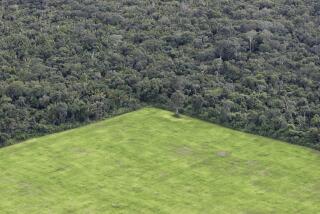Plans Drawn to Link Latin Economies
- Share via
GUADALAJARA — In the largest such gathering without the United States, the leaders of 19 Latin American nations, Spain and Portugal agreed Friday to form a permanent Iberian-American “community” to help tie their economies together and enhance their influence in world politics.
Ending a two-day summit, the presidents and premiers adopted a broad agenda of commitments to democracy, human rights and free trade and efforts to eradicate cholera, cocaine trafficking, pollution and poverty in Latin America.
Cuban President Fidel Castro, submerging ideological differences with Latin America’s elected, pro-capitalist leaders, joined in signing the document as a step toward ending his political isolation.
Convened by Mexican President Carlos Salinas de Gortari, the first Iberian-American summit was also a diplomatic coup for Spanish Prime Minister Felipe Gonzalez. It grew from Spain’s vision of marking next year’s 500th anniversary of Christopher Columbus’ first New World voyage by forming something like the Commonwealth with its onetime British colonies.
“Five hundred years after our first encounter, we are determined to project the force of our community into the next millenium,” said the summit communique. “We aspire to become a full player on the world stage.”
While agreeing to meet each year, the leaders set up no mechanism to make their new alliance as structured, say, as the 12-nation European Community. Nor did they challenge President Bush’s year-old Enterprise of the Americas Initiative that would slash foreign debts and create a vast free-trade zone in the Western Hemisphere.
But the summit appeared to solidify Gonzalez’s longstanding diplomatic influence in Latin America, where he is a major aid donor and often at odds with U.S. policy. And it gave Latin America a window through Spain to the European market.
“If the rich countries made an effort like Spain, the (Latin American) continent would soon be different,” Gonzalez told reporters. “We are making an effort to help build democracy and economies.”
King Juan Carlos I attended the summit to underscore Spain’s interest and agreed to host next year’s meeting. Portugal, former ruler of Brazil, was represented by President Mario Soares and Prime Minister Anibal Cavaco Silva.
Bush telephoned Mexico’s Salinas earlier this week to wish the summit success, and Spanish officials said their initiative was not meant to threaten Washington’s interests.
“The United States doesn’t want a monopoly on relations with its neighbors to the south,” said Spanish Foreign Minister Francisco Fernandez Ordonez.
But the summit without Bush afforded a less-confrontational environment for Castro to nudge his way into the Latin American fold, while allowing such statesmen as Gonzalez, Salinas and Venezuelan President Carlos Andres Perez to press for making Cuba’s one-party socialist state more capitalistic and democratic.
Castro, who seized power 32 years ago and has never stood for election, gave no hint of willingness to change. The draft statement he signed was a compromise. “Our community,” it said, “is based on democracy, respect for human rights and fundamental liberties,” but “the right of each nation to build its own political system and institutions is recognized.”
The communique endorsed steps taken by nearly every Latin American nation except Cuba over the past year to slash trade barriers, military spending and bureaucracies and to form sub-regional economic blocs in a search for new markets and investment.
It pledged “all efforts necessary to free our citizens before the 21st Century from the scourge of misery.” And it called for a special fund to help the Americas’ indigenous peoples, whose ancestors were conquered by Spain and Portugal, “to resolve their urgent problems without paternalism.”
A U.N. report prepared for the summit said 44% of Latin America’s 430 million people live in poverty. A report by the Inter-American Development Bank said a major intensifier of poverty, the debt crisis of the 1980s, could be overcome with 4% to 5% annual growth rates in the 1990s if the Latin governments’ moves to reform their economies attract sufficient private investment.
The bank’s hopeful forecast was echoed in summit speeches. Said Argentine President Carlos Saul Menem: “We hope to reach the year 2000 without the vices of our colonial past, without nuclear risk, without narcotrafico, without environmental ruin, without a scandalous breach between rich and poor.”
More to Read
Sign up for Essential California
The most important California stories and recommendations in your inbox every morning.
You may occasionally receive promotional content from the Los Angeles Times.










